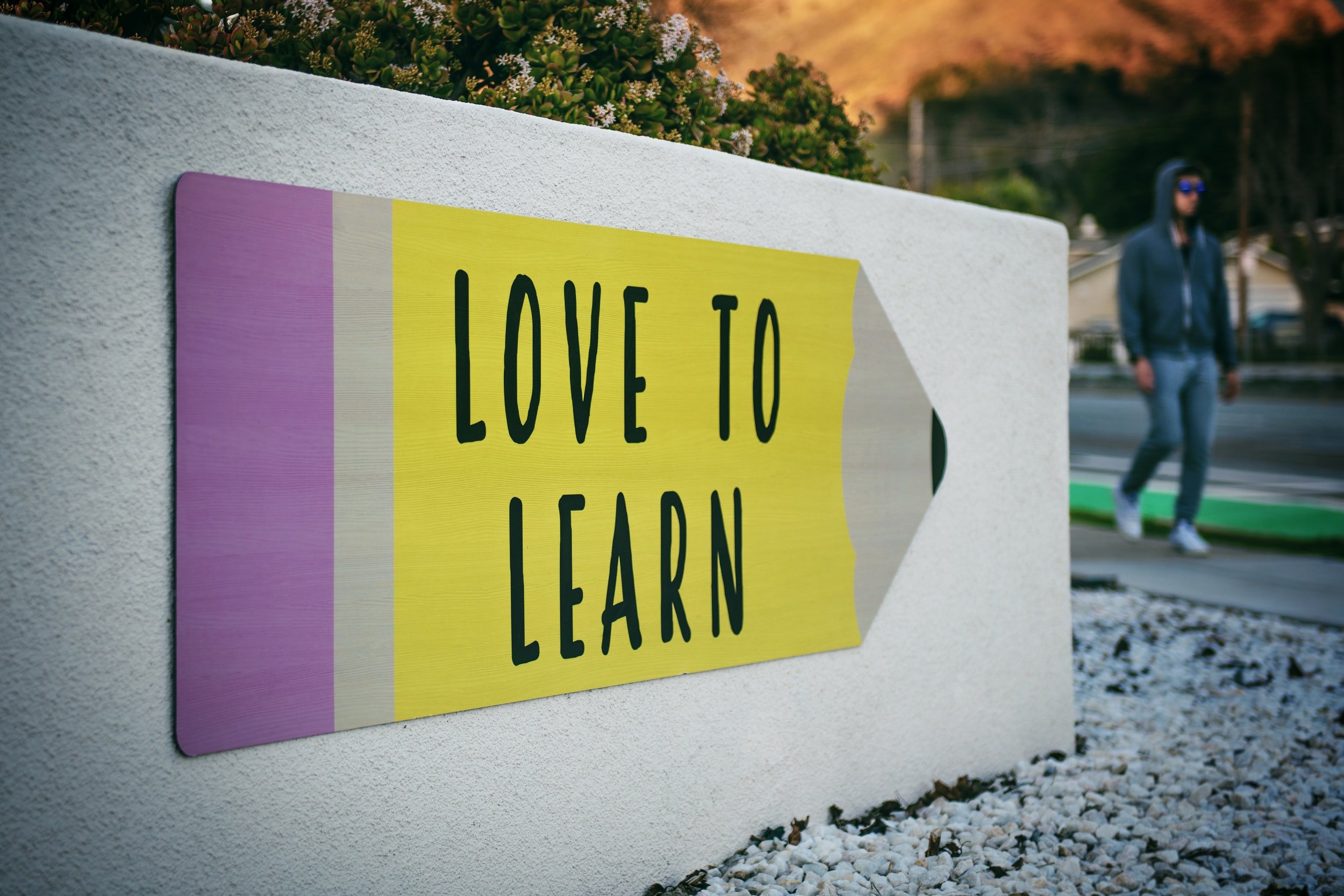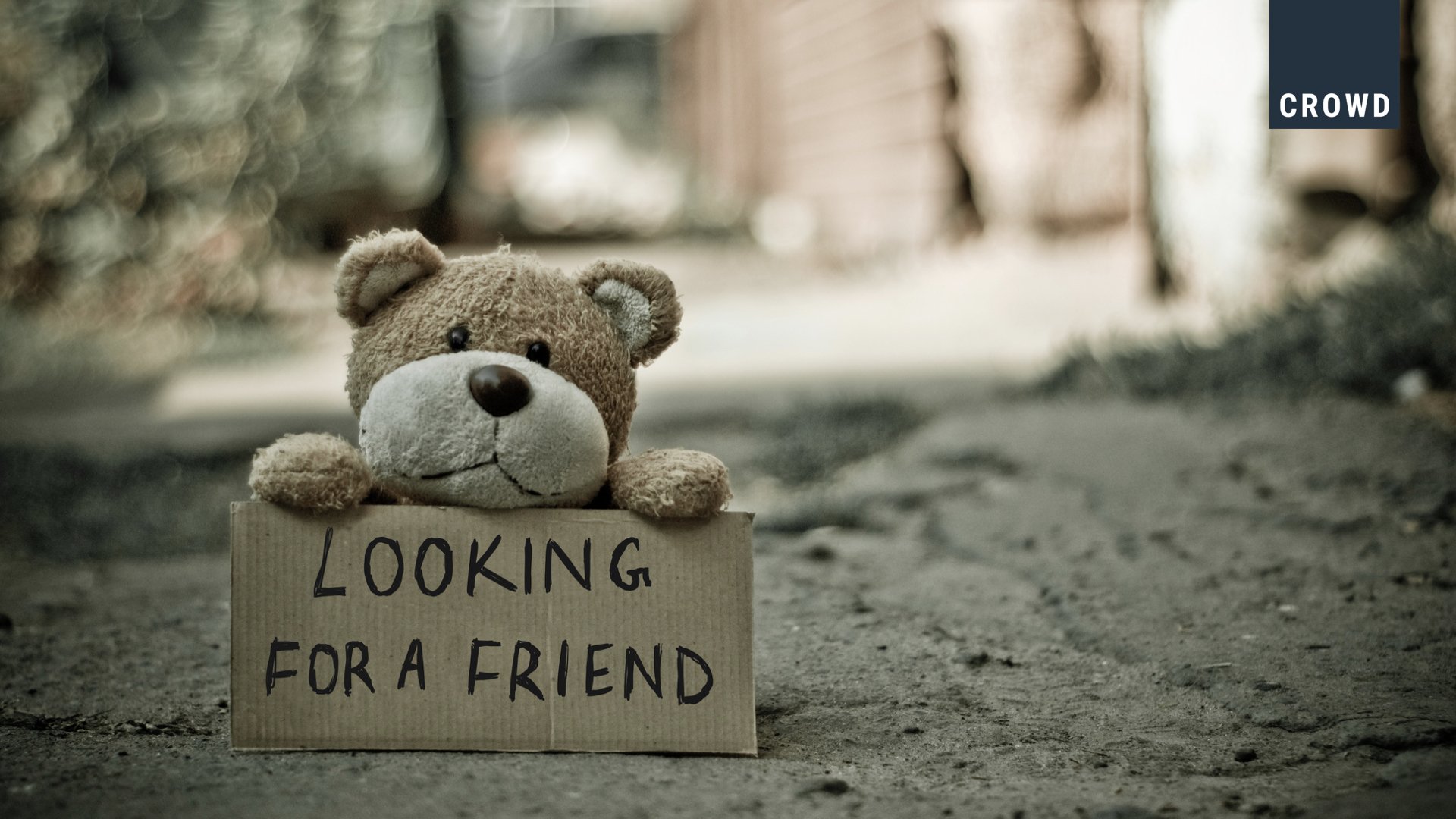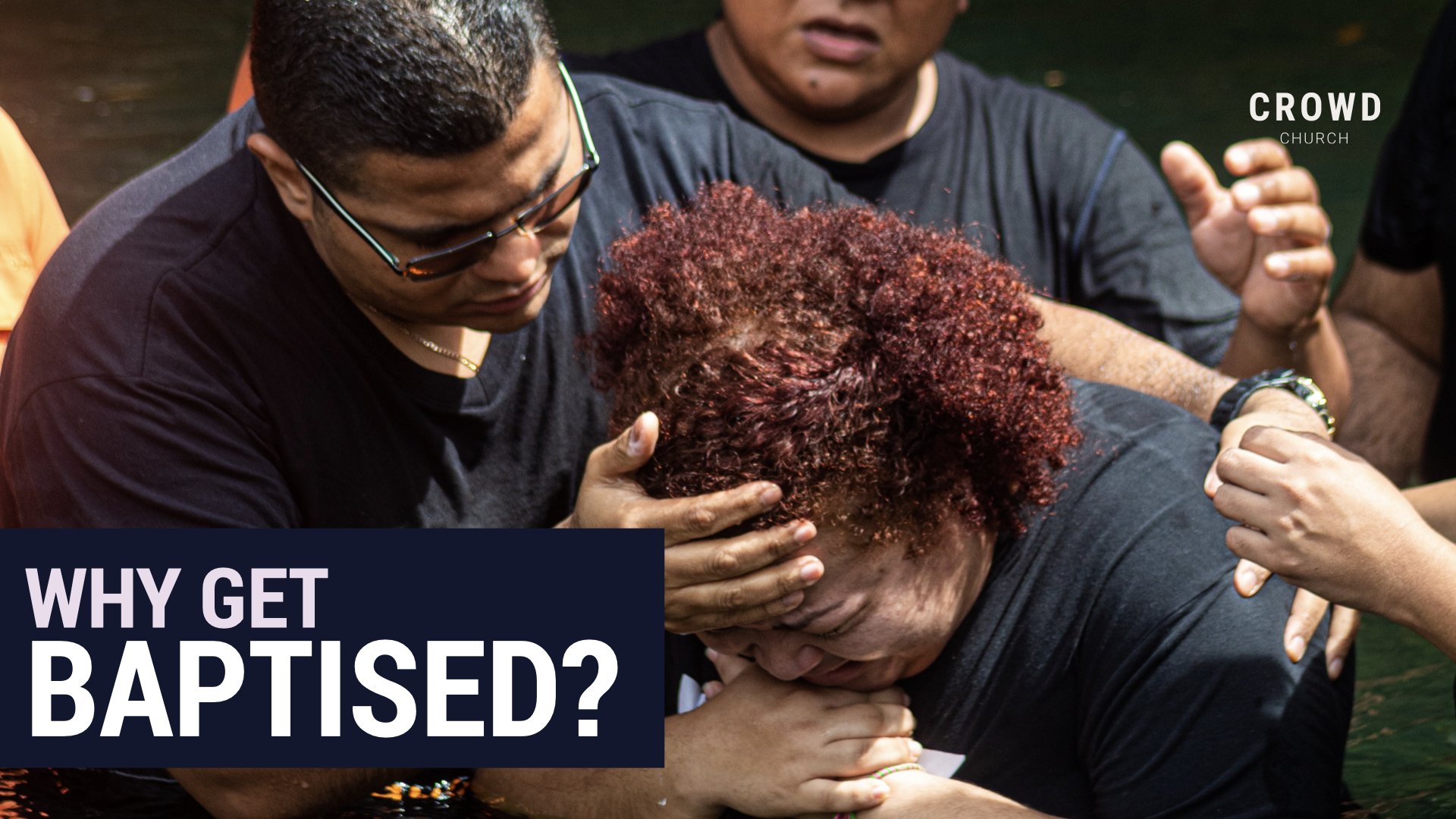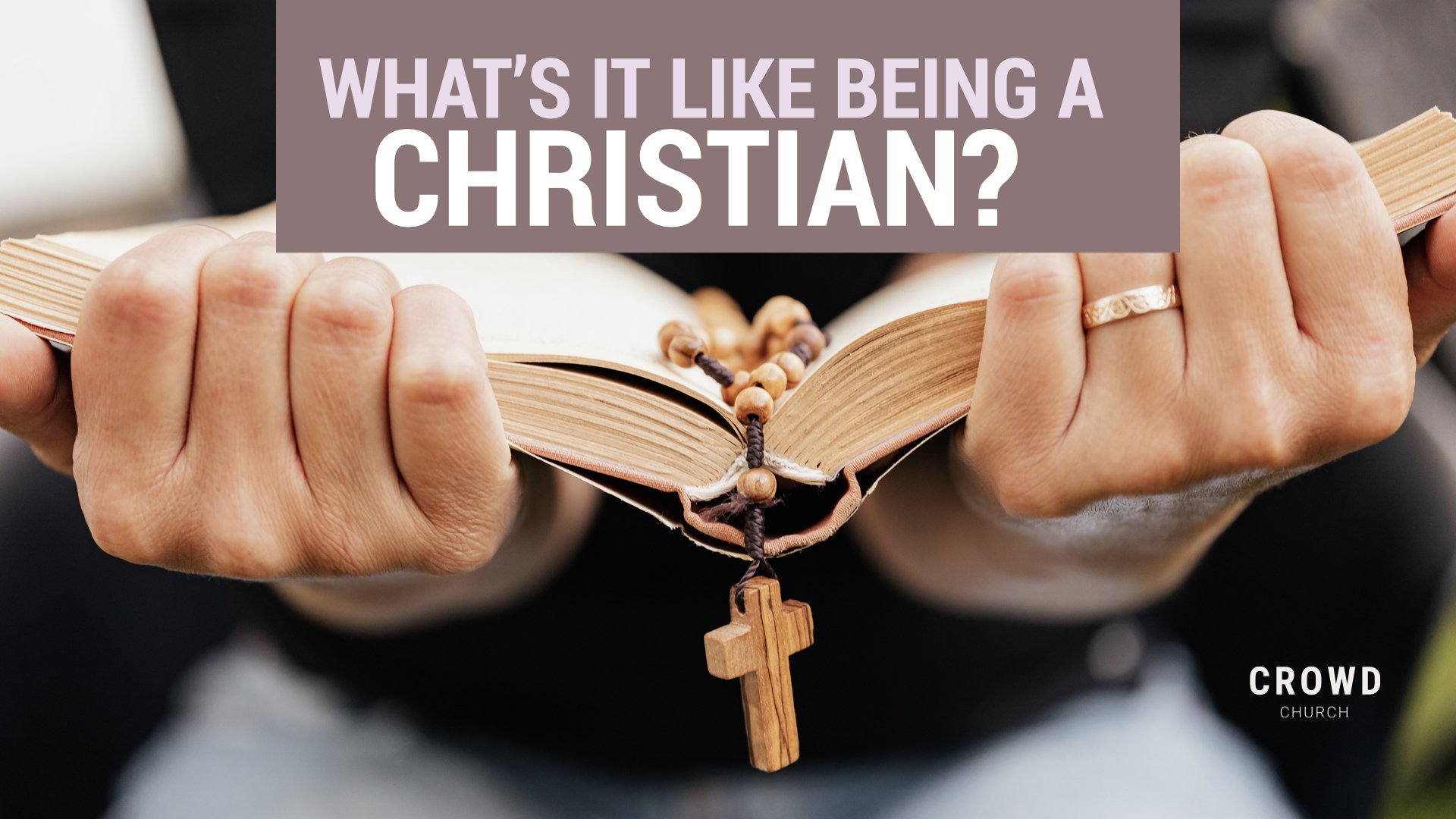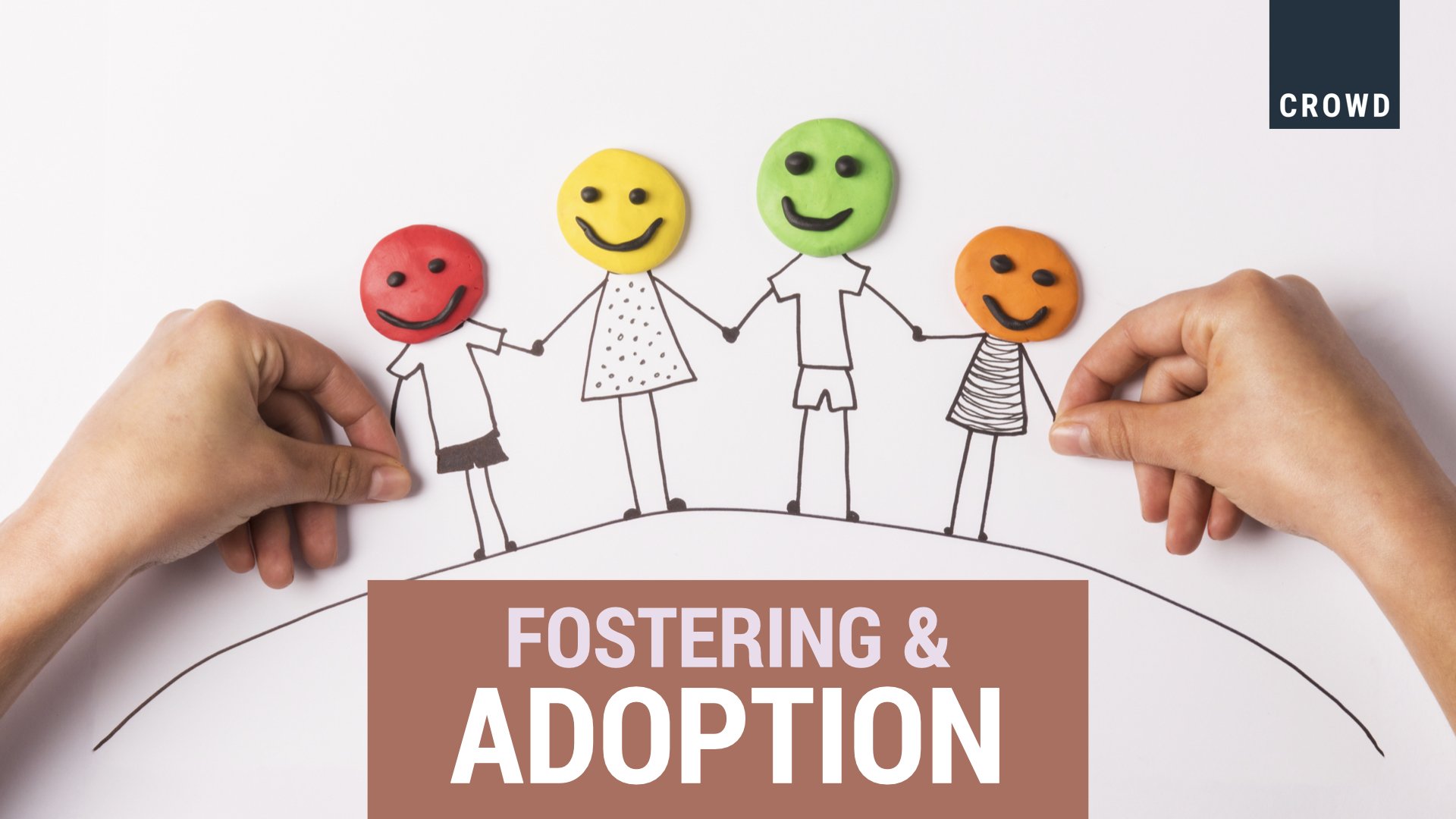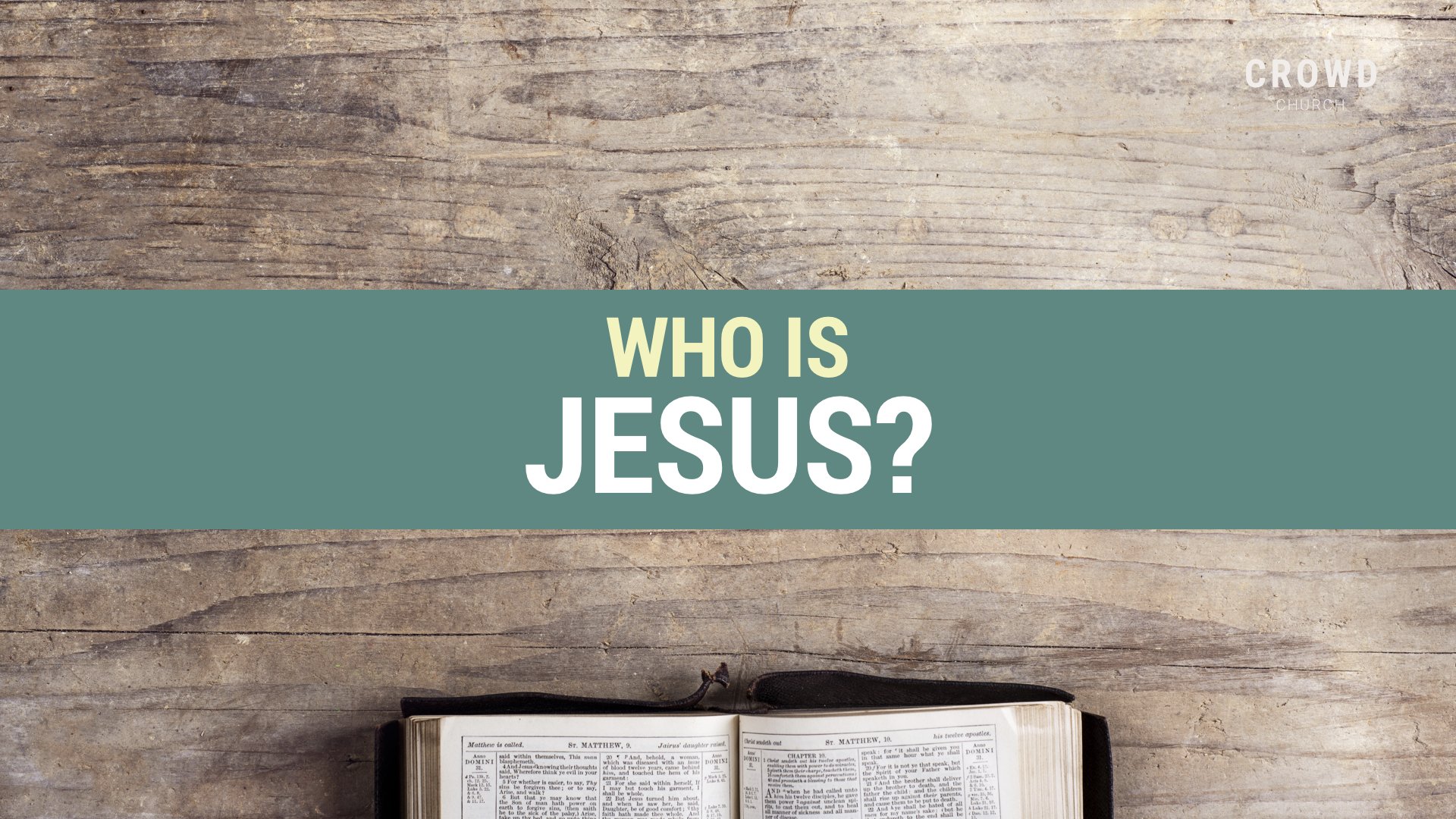What Does The Bible Say About Education?
Video Timeline
WELCOME
0:00 - Welcome with Matt & Phil
TALK with Will Sopwith
06:47 - What Does The Bible Say About Education?
08:07 - How Has The Bible Influenced Education?
10:33 - Sunday School & Education
11:49 - Christians Who Helped Further Education
13:02 - The Bible - A Miniature Library
14:49 - Examples Of Educated People In The Bible
16:33 - The Bible Values Wisdom Over Knowledge
18:26 - How Can Education Become Meangingful?
19:15 - How Do We Interpret Knowledge?
24:03 - Types Of Education Mentioned In The Bible
24:04 - Paul
24:26 - Jesus
27:00 - Conclusion
PRAYER
29:48 - Prayer For Ukraine
WORSHIP
32:22 -O God Be Our Guide with Lyrics
CONVERSATION STREET with Matt, Phil & Will
33:16 - Conversation Street
35:15 - Why Do You Think Education Is So Powerful?
38:58 - What About The State School System?
42:22 - What Is A Worldview?
48:39 - What Do You Think We Can Do To Help Our Kids In School?
52:54 - How Do You Choose The Right School For Your Kids?
59:35 - Do Ofsted Ratings Make A Difference?
01:03:58 - It Takes A Village To Raise A Child
Podcast:
What does the Bible say about Education?
— Will Sopwith
What does the Bible say about education? Well, my teacher friend, Phil tells me that the word "Education" comes from two Latin roots - educare, which means to train or to mold, and educere which means to draw out. And there's this dual meaning of the input of knowledge as part of education, but then also our response or reaction to that knowledge.
Education can be general and informal. It can also refer to a more formal system of education. And what I'm not talking about today is people as learners, because people are natural and amazing learners, all you have to do is watch a newborn baby in their first year and you'll see how much they learn and develop in terms of skills and knowledge in that first year. People are natural learners. So I'm going to talk more about intentional education and attempts to teach.
So I'm going to share a few thoughts about what the Bible's influence on education has been and is, different types of education in the Bible, and then finally, the example of Jesus.
How has the Bible influenced Education?
So to start us off, a quote from Nelson Mandela, the freedom fighter, social campaigner, and eventual president of South Africa. And he said,
“Education is the most powerful weapon you can use to change the world.”
— Nelson Mandela
And I think this sentiment is a clue as to why the Bible has influenced the establishment and spread of education quite so much. Because the Bible is full of this imperative to change the world for the better, for us to be changed so that we can go on and change our wider world. One example of this is in Deuteronomy 10, verse 18, and in there's a command to God's people, to defend the cause of the fatherless, and the widow. And throughout history, children and women, and especially those without families to provide for them have been among the most vulnerable and exploited people. And even now, in the 21st century, there is still in some parts of the world a fight for the rights of women and children to receive literacy, numeracy, the skills they need to avoid that exploitation. And historically, the Christian Missions Movement, compelled by the Bible to make disciples in all nations has always gone hand in hand with introducing schooling and training to communities where there is none, or amongst the neediest.
Why? Well, knowledge is power. As we've heard from that quote from Nelson Mandela, power to change your circumstance and power to change the world. And these are themes from the Bible. Throughout the Bible, from the escape of Jews from slavery led by Moses, right through to the teachings of Jesus, the formation of the early church, there is this theme of power to change the world.
Sunday School & Education
In parts of India, the word for school literally means the building beside the church. School and missionaries are just inseparable. Setting up schools has always been part of the Christian mission. The first Sunday schools began in 1780 in Gloucester, set up by a guy called Robert Rakes. And he was appalled by the destitution and criminality of the majority of young people in the town where he lived. And these young people would be working 12-hour shifts, Monday to Saturday, in fields and factories and completely without any form of formal education, and very little time for it. So for an hour each week before church, there was Sunday school, and this was introduced to teach reading and writing to whoever wanted it. And it was quickly oversubscribed and many more Sunday schools were set up, and the movement spread across the UK and into America. And for many, this was the only source of education until schools became more organized and laws were changed to allow and then enforce the education of children.
Examples of Christians who helped further Education
Louis Braille was a boy blinded at the age of five in France, who went on to develop the system that is now used worldwide by those unable to see, that system of raised dots that we call Braille. He was a committed Christian. A French priest called Charles-Michel de l'Épée was the one who first opened a public school for deaf children in Paris. And in translating the whole French alphabet into sign language, actually became the basis of international signing that we use today.
So, these are a few examples of the faith of followers of Christ guided by the Bible that inspired these initiatives in education. And people reading the Bible have been prompted by words like those of Jesus in Matthew 19:14,
“Jesus said, “Let the little children come to me, and do not hinder them, for the kingdom of heaven belongs to such as these.””
They're not at the bottom of the heap, they are important. And they should have the opportunity to know God, to be trained and educated. So as well as the inspiration to transform society, the Bible actually as a book has had quite a significant impact on education.
The Bible - a miniature library
The Bible is a whole library in miniature. It has books of history, poetry, philosophy, leadership, eyewitness documentary, and lots of different literary styles. And Christians have worked through history to mass print it, translate it, and generally make it as available as possible.
Why? Well, because we believe it holds the keys to life. And the result is that the Bible might have been often the only book owned by a family or community. And because of its status as a kind of mini-library of different literary forms, it becomes an excellent resource for literacy. And for many cultures around the world, where language is traditionally spoken only, there is no written down form of language, it's been portions of the Bible, that have often been the first written material and the basis then for developing a full written account of that spoken language. And that's because of the efforts of Christians, again, inspired by what the Bible teaches.
The message of the Bible is also a direct encouragement towards education or at least developing and using our talents. So a few examples, Psalm 119:33 says, Teach me your ways, oh, Lord, and in 1 Timothy 4:14 we're commanded, Do not neglect your gift. And Proverbs 1:7 has the description of a fool as one who despises instruction and wisdom.
Examples of educated people in the Bible
And amongst people God uses in the Bible, some of the well-known figures mentioned are:
The scholar Paul, who wrote a lot of the letters in the New Testament.
Artisans like Huram-Abi in 2 Chronicles 2, and he was an expert in working precious metals and commissioned to decorate Solomon's temple.
There was Solomon himself, a king of Israel, who was famed for his wisdom and learning and who wrote three books of the Bible.
Daniel is described in the first chapter of Daniel as a young man showing aptitude for every kind of learning.
And then Joseph from Israel, sold into slavery in Egypt learned Egyptian culture and was very skilled as a manager and administrator.
But most importantly, educational status is not a definer of our engagement with God. There are no glass ceilings in God's kingdom because of how qualified we are, as it sometimes feels there are in our society and economy. There are no minimum essential criteria required in our application to follow Jesus. God used those who would have been considered uneducated, just as well as the clever ones.
There was Amos, the shepherd, a book in the Old Testament Prophets, Peter, the fisherman, one of Jesus's key disciples, and he was even described in Acts as uneducated and untrained, Gideon, the youngest least important son of a farmer who went on to become an important leader of Israel in the Old Testament.
The Bible values Wisdom over Knowledge
And one of the reasons Christians have worked so hard to translate the Bible into local vernacular languages is this faith that there are no limits to knowing Jesus whereas before it was only those who are educated enough to know Latin or maybe in modern-day to learn English that could read God's word. God's word offers salvation for anyone and everyone. You don't need a degree in theology. You don't need a degree in anything. You don't even need a GCSE to know God. See what God has described in the Bible as valuing most is not knowledge, but wisdom.
Paul was a very learned man and writes in 1 Corinthians 8,
“But knowledge puffs up while love builds up. Those who think they know something do not yet know as they ought to now.”
And again, writing in 2 Timothy 3:7, he encourages Timothy to be careful of people who are always learning but never able to come to a knowledge of the truth.
Paul knew that education can actually be a trap. Knowledge, without wisdom or understanding, is just a load of facts. It can even make us too proud to engage with God's wisdom, who can teach us anything right? Even wise Solomon in Ecclesiastes 1:13, writes, "I applied my mind to study and to explore by wisdom all that is done under the heavens.", which basically means everything in the physical world that he could see. "All is meaningless", was his conclusion.
How can education become meaningful?
So how can education avoid becoming a meaningless bunch of information, knowledge divorced from understanding, or the concept of education that includes our response to what we learn?
All information we receive gets slotted into our existing view of things and builds up what's called our worldview, which is the lens through which we understand the world. It's why fake news can amplify so quickly in social media echo chambers, we tend to fit information into our preconceived understanding, rather than evaluate it at face value. It's a natural response, we all do it. And I think part of the wisdom that the Bible talks about and values is referring to the worldview that we fit our knowledge and learning into.
How do we interpret knowledge? What does it all mean?
The Bible actually gives us a very coherent worldview, that many Christian schools, including here in Liverpool, seek to base their education around. If you like, it's the Bible's view of reality. It describes four main truths.
God created all things, and he created them good.
Creation has been spoiled by humanity's self-centeredness and rebellion, which the Bible calls sin.
Jesus died and rose from death, a perfect man, and yet God, to cancel out the effect of that spoiling.
One day, in the fullness of time, God's creation will be restored to its initial perfection and goodness. And how we live can contribute to that eventual restoration. We each have a part to play for good or bad towards that restoration.
The reason this makes sense as a worldview for education is that it not only illuminates why there is tension between what was fundamentally good but seems to have become messed up, it also gives us a very clear purpose and hope for our learning and understanding, to participate in restoring that innate goodness. It knits our personal development into a much bigger picture, a much bigger story. I wonder what alternative worldviews you've encountered at your school or perhaps in your children's school. It's worth thinking about. Ultimately, God holds us as parents accountable for our children's education. And if you have children, what lens do you think they are developing?
I think from my school, the worldview I picked up most was get good grades, get a good job, be influential. That's success and that's meaning, which you can't really argue with but it's a little bit hollow. Perhaps another version is to get knowledge so you can be self-sufficient and not dependent on anyone. That way leads to happiness, self-sufficiency. Or even it's all about you, your self-determination, you have the opportunity to do, to be whatever you like. That's certainly the tone of a good chunk of advertising, and the ad film and all media really. It's not hard to imagine, as many commentators have that our education system is more concerned with making our children economically productive in society than actually training them in wisdom. Training people up for jobs, rather than for life. Worldview is really important and education has a big part to play.
Are we training children in selfishness or service, in self-sufficiency or interdependence in community, in knowledge or in wisdom? Now, I'm not an educationist. I've never studied educational theory. I'm not necessarily saying this is what an education system should look like. I'd leave that to much cleverer people. But I do pay attention to God's word as a source of wisdom. The Psalms encourages us to meditate on God's ways, which I take as meaning chewing over God's word and getting all the meaning out of it. Some examples are Psalm 119:97, which says,
“Oh, how I love your law! I meditate on it all day long. Your commands are always with me and make me wiser than my enemies. ”
Proverbs uses that analogy to teach concepts, it teaches deeper meaning through a picture if you like. So a couple of gems, Proverbs 25:14,
“Like clouds and wind without rain is one who boasts of gifts never given. ”
Another one, Proverbs 26:17 says,
“Like one who grabs a stray dog by the ears is someone who rushes into a quarrel not their own.”
Types of education mentioned in the Bible
Paul
We've already mentioned Paul who was trained by a famous rabbi Gamaliel. And his teaching would have included learning scriptures by heart, through repetition, learning interpretation of the law from past case studies, and building on other rabbis' rulings, much like a lawyer would today, but also the use of analogy and parable to teach truth.
Jesus
Jesus was also a rabbi, which literally means teacher, but not formally trained as one. And he used parables from everyday life to teach about God's kingdom. He used everyday situations to be as accessible as possible to normal people. He wanted his listeners to think more deeply than just a trade-off of question and answer.
A rich young ruler wants to know what the most important commandment was, for example, and Jesus told them a story about the Good Samaritan. Someone else wanted a description of the kingdom of heaven. And Jesus told stories about the lost sheep, the lost coin and yeast in dough. He told stories about the sowing of grain and a rebellious son leaving home in scandal. And Jesus is described in the Bible as someone that people listened to for hours, sometimes days.
Jesus was also an excellent coach. For his followers, his approach was completely immersive. He shared three years of his life with his closest disciples. They ate together, travelled together, ministered together. His closest followers learned by watching, discussing and imitating. Jesus put them in situations where they needed to take initiative and practice leadership. And then they'd go away together to debrief. And all the time they were developing skills, growing in insight, and of course, hearing his teaching and witnessing the miracles. His primary call to them as his trainees and the same to us is follow me.
After three years of this education, these followers who were a mix of educated and uneducated started and sustained a movement that now counts around 2 billion people among its members. And this became a movement that has survived lots of attempts to squash and exterminate it by various successive power structures. So initially, the Jewish religious elite tried to stamp out the church, then it was the Roman Empire. And then with the rise of Islam across the Middle East and North Africa, Christianity survived the power struggles between the Pope and the reformers who wanted to translate the Bible, and finally, it survived Nazism and Communism and continues to grow even under persecution today, particularly in Islamic countries. I think you could say Jesus was an effective teacher.
Conclusion
So in summary, the message of the Bible has inspired the establishment of education through history, inspired people to reach out and develop others, often through teaching and training. Developing our gifts and our knowledge and our understanding is encouraged by the Bible, but the level of our education or qualifications is no barrier to knowing God. God values wisdom and understanding above knowledge.
And the Bible gives us a framework and perspective in which education makes sense, a worldview for wisdom. And finally, Jesus taught by coaching and by stories, and his call to each one of us still is "follow me". He's an excellent teacher. And one of my favorite sayings that he spoke is recorded in Matthew chapter 11, verse 29, where He says, Take my yoke upon you, as in the bit of wood that you'd put across two cattle plowing,
“Take my yoke upon you and learn from me, for I am gentle and humble in heart, and you will find rest for your souls.”
CONVERSATION STREET
With: Matt Edmundson, Phil Watson & Will Sopwith.
What is Conversation Street?
Conversation Street is part of our live stream, where the hosts (in this case, Matt, Phil & Will) chat through Will’s talk and answer questions that were sent in through the live stream. To watch the conversation now, click here.
Matt Edmundson - Will, you mentioned a quote from Nelson Mandela about how education can change the world. And then you talked about how missionaries and education were kind of synonymous with each other.
Why do you think education is so powerful?
Will Sopwith - I think the kind of historical context that I was talking about there was this realization that there are the poor, the exploited, and those without, and education is a route out of that. So that whole emphasis on there is injustice. We are made in God's image and everyone deserves a chance and education is the way out of that. So if you're being exploited and it's probably because you can't read the contract that you have just been asked to sign or something like that. And humanity is full of these levels of injustice. Humanity will find some way to put someone else down to exalt themselves.
And I think the reason education is so powerful is that theoretically, it's something that everyone can engage with because we are all natural learners. And so there's an opportunity to learn about the wider world, which just levels that playing field. And of course, the rich and the privileged have always found a way to stay ahead throughout the history of education, which is fascinating. But I think fundamentally it's allowing people the same kind of opportunities as each other and lessening that Gulf of privilege if you like.
Phil Watson - The church is responsible to some extent, for something called the patriarchy, which is the dominance of males throughout time. But if you look at the Bible, who will mention the widow, a female in that culture with no male, no husband, which would put you low down the pecking order. So we must look out for people who are that marginalized, with very little social power, and the chances of the widow and the orphan, having any influence on anyone else, or even on their own life to better it would have been minimal.
And I think it's really interesting that the Bible talks time and time again of those most marginalized people in society. So if the church has hurt you, it's not God and Jesus and the Bible, it's human beings taking something and abusing it. And that I'm afraid happens in any society or structure that people see as a vehicle for power.
What about the State School System?
Matt - That's good and bringing it back to what Will said, you see the lack of education in the marginalized. Is it the case in the state school system? I mean, we live in the UK, right? In theory, everybody should have equal education opportunities. I don't know if they do. You're a teacher in that system. Do they?
Phil - I think, knowing a little bit about education around the world, if you happen to be born in the United Kingdom, throughout the history of time and place, you've got a pretty good deal. You might see that your deal is not as good as the next person's within the UK, but of the 7 billion people on the planet, most of them from an education point of view would see Britain, Europe, the Western world, as being a chance where education is offered to you, you might not necessarily take it, it might not be as good in one school as another, but in the UK, if you're four years of age, you're obliged to go to school, your parents are obliged to send you, and there will be a place for you. And that schooling doesn't end till you're 16-18 years of age. And if you look at the history of mankind, that's a pretty good deal.
I do think the education system in the UK is generally pretty good. Most people end up literate and numerate. However, you can see a situation where people from a particularly privileged type of school ended up dominating very influential roles. And there was an irony for a brief period where the Archbishop of Canterbury, the Mayor of London, and the Prime Minister of the country, all went to the same school. And I think in that school, they were all in the same house. For any egalitarian society, where we believe that your merit, your ability, skill, hard work, and diligence is going to get you somewhere, it seems fairly unlikely that one school is going to provide three of the most powerful positions in the land, I'm not saying those people shouldn't have been in those positions. I'm just saying, statistically, that does strike me as being unlikely.
Will - However, every child, no matter where they are born or what postcode they're from, up to about the age of two, I think most children have a similar level of ability in terms of their learning, their intellect if you like. And, for many, it's when they then hit the school that might be in their postcode, that you begin to get this kind of separation. And that's not all because of the schools. It's not all because of resources in the schools. Partly, it's because of the kind of situation children are living in, whether they're read to by their parents, for example, that kind of thing, whether their parents are around even.
But it's astonishing that early on in life, every child has the same potential for learning. But actually, it's our culture and the way we organize things and geography, frankly, in the UK, that begins to kind of separate those two lines until by the secondary, you've got this gulf of opportunity and progress. But I also think that the more marginalized ones are those that don't necessarily engage with education as we have structured it and decided that should be the way and those that don't get on with that intellectual side. Thinking much more broadly about how we do education is a massive topic and really hard for any government to get right. But understanding how each child engages with it and what's really going to enable them to fulfill that potential because it might not be physics.
What is worldview?
Matt - Will, you talked about worldviews in your talk. Just for those that maybe have joined in late or maybe didn't fully understand what you're saying, just explain what you mean by worldview.
Will - So the best analogy for worldview is it's a lens. If you had a camera or some binoculars and you put a blue lens in front, everything looks blue, once you put a red one, everything looks red, it changes the way that you look at something. And worldview is that, it's very complicated. And we build up our worldview from the moment we're born, more or less, we take cues from nature, the things we learn, the role models we have, it all affects our worldview, and it's really how we make sense of the world.
So when we learn a fact we will tend to slot it into how we understand it. So, here I'm looking outside, there are people playing cricket on the grass over there. I think summer and I think all people play cricket because opposite my house there are people playing cricket. That's your assumption. And of course, as you go through life, those assumptions begin to be challenged. But there's a sense where we try to take new information and slot it into what we already know rather than dismissing everything and starting again. But that is worldview. It's that lens that we build up, of how we make sense of the world. And it's something we take for granted. But it is something to be very, very aware of because the system of education you're in actually has a massive impact on the view of the world you build.
Phil - That's really interesting because it's something called the PISA studies which ranks where schools and education systems come in comparison to one another. And it seems to be a fairly Western obsession with having a league table for everything. And I believe in it, Estonia is at the top. And so as a teacher, we get told, "Oh, Estonia is doing better, you need to be more like Estonia." And you go, "well, then we need to adopt Estonian policies." And here's one that's a bit of a shock to English people watching this most of the world in the USA and Europe, particularly, don't start teaching children formally in school till they're six. You look at Scandinavia, for example, where there's far more exploring and playing and to some extent, my argument against the English education system is we've decided that you need to be crammed full of facts that need to be tested regularly, even if the information is of no use whatsoever. And I'm looking at your fronted adverbs, I can speak German, French, Dutch, and a few other languages. And I still couldn't do my child's primary school homework. And even worse than that, I can't even see the point of doing it.
And if you are a parent and you're worried about your child's education, that's great because it shows you're concerned. Don't necessarily worry about your child meeting the educational milestones that the United Kingdom has brought in, which says, by the age of 11, you have to have done that, at 16, you do your GCSEs, at 18, you have to have done A levels. It's perfectly possible to revisit education as you get older, and have another look at what you didn't know.
Many people that I know, and I'm one of them, have changed career paths as they got older. So I was an export salesman for quite a long time. I don't know why. It didn't suit me at all. And then I became a youth worker, and then I became a teacher, then I became a foster carer. And now I work in promoting fostering and comes back to our saying at the beginning, which is if you can remain teachable, it's amazing what new things you could pick up as you go along. And I think as parents we can become competitive with our children and think they're not doing as well as that child, or that they've got into that school, my work as a parent is done. It isn't ever done. It's never done.
Matt - I guess one of the questions is what can I do? Or what should I do as a Christian parent, I suppose any parent needs to think about it but as a Christian specifically, my kids are in school, what should I do?
From a Christian point of view, what do you think we can do to help our kids in school?
Phil - I've got two tips. One is if you can eat at a table as a family, eat at a table. But this is completely unscientific. Sorry, Will, but my experience of children that I teach, it's the ones that have sat at a table, particularly with a mum or dad or intergenerational, or grandparents, adults, cousins, whoever it is, friends from a different background, and you eat, and you chat, and you'll learn an awful lot about character from that scenario. So I've got two birth kids, an adoptive kid, and a variety of foster ones. And if I had one tip, it would be to eat at a table.
And the second tip is if your children are still young, you can deal with it when they're older as well is, and this is statistically proven. Research suggests that parents that read to their kids, those kids do better in education, and in numerous other life scenarios than children who aren't, and I guess it would suggest a parent or an adult figure who wants to spend time with their child.
Will - In those two examples, relationship is the key. And, you know, as Phil said, we have this ridiculous kind of hierarchy of league tables for everything. And the choice between a school where your child is in community, learning to be in community, learning service within a community, as opposed to being in a top-flight school getting A's and everything, there's just no contest between those. And I've said about worldview at the top, I think that's very, very important as well. But yeah, the relationships, not only at home but within the school are massively important as well.
And you get all sorts of scenarios where the potential of a child growing in terms of their learning, in terms of their wisdom and their understanding may come well after school, it may come much later in life doing something completely different. But if in that process, they're learning how to relate, how to be part of a community, whether at home or at school and learning those soft skills are massively important. And seeing our kids slot into a community that's kind of not just their age group, although that's the way schools generally are structured for all sorts of reasons. But having the opportunity to relate more widely, relating across age groups is also massively beneficial for kids. Not everyone has that opportunity. But I think we can get hung up on the grades on the parents' evening. But actually, there are other things that if you think forward in life, can be far more significant for our children.
Matt - I think that's a really interesting point. And one of the questions which I know people are going to want to answer is, especially if they have young kids, and maybe just tell your stories, because I've put my kids in a certain type of school. Will, you and I have a similar background on this. Phil, you are slightly different.
How do you choose as a parent, or as a Christian parent, the right school for your kids?
Phil - It's not a choice necessarily because in some areas schools select and in some areas they recruit because they need to fill their allocation of children. And you'll find that the schools vary. And in the UK, we recently had the day when you got a letter from your council saying which school you got into. And some people will be delighted "Oh, my kid got in", and other people will be bitterly disappointed go "my child's life has ended because at the age of 4 they've not got into this school."
My advice would always be to trust your parenting because parenting creates character and character is more important than school. Although school is very important. We also have all sorts of shenanigans in the United Kingdom where your postcode can determine which school you go to, and your postcode can be determined by the price of houses. So whilst you might be for or against private education, I'm fairly ambivalent towards it, but you might go well, I have to live there to get into that school. We've got to pay money.
In Liverpool where we all are, we have another scenario, which is quite absurd, in my opinion, even though I work in one and I'm a governor in another and two of my kids go to others. We've got faith schools, where we're just state schools, so there's a Church of England or Catholic, or there's a Jewish one, and you have to suggest or show that you're of that faith, or at least interested in that faith to get in. And all these things make an incredibly complicated situation and scenario. And to choose a school there are various things you think about. And I think going along and getting a gut feeling, is probably as good a reason as any, but I wouldn't go to the schools that you've got no chance of getting your kid into, because you'll just get disappointed.
And it might be that you begin to manoeuvre what you do and where you live to get into a school. So for example, if you have to live within a mile, more or less of that school, then you need to move to get into that school. There's no point in applying if you're not in the catchment area. So often because I work in a school that's considered pretty academically high achieving, it's a great school, and people ask me, How do I get my kid in? Can you give a reference? and you go, that won't make any difference, you need to read the criteria and go on the website to read what it says to find out how you get into that school, and visit it and meet people whose kids go there and ask them what they think about it.
It's also helpful if you know your child. So if you know your child is not particularly sporty as an example, and you go around the school where you might send them, and all they talk about is the brilliant football pitches, table tennis, etc. You might go, "Well, this isn't for my kid, my kid prefers this type of activity." So there isn't one school that fits every child, you have to know your kid. Know the schools, and then try and apply that way. As I say, for most people, in most parts of the UK, you don't get much of a choice. And dare I say, probably your kid will do okay.
Will - Well, I think Phil's far more knowledgeable on this than me, he works in school. But actually, I remember some advice you gave me when we were all stressing about going into reception. And I felt that responsibility of where our eldest was going to go to school. And you said something like, actually, it's the kid they sit next to that has more of an impact than everything else. And I think, again, there's real truth in that, in terms of that relationships are key for our kids growing up.
I think the choices that I've made are the ability to be part of our kids' education. So not just at home. And there are some schools, which I think do that better. And there are some schools, particularly I think, at secondary that I've experienced, where it's like, "We are the professionals, you are the parents, and we want you to come to parents' evening, but leave your kids with us, they'll be fine" kind of thing. And I don't know whether that rings true as a teacher at all, but that sense of "Let us do the teaching, you've done your bit dropping them off each morning". That is a very poor experience.
And, before God, I feel that responsibility for us to be teachers. Now. I could not teach our children curriculum, I could not get into GCSEs, somebody would die. I just don't have that skill set at all. But I want to be part of what they've been taught. I want to be able to engage with their teachers. And I think the moves that we made from a more state system into the Christian School was great, there was an increase of relationship immediately, which has had a profound impact I think on us as a family. But it can't be something that causes a lot of stress. I kind of knew that. And in a sense, along with any kind of parenting decision, only time will tell you.
I think for me, the school that I went to, I definitely survived. There were all sorts of amazing opportunities. My dad taught at a private school. So we got free private education like I grew up on-site. By the time I was 18, I was just so ready to leave. I didn't belong there. And I look back and go, yeah, there were lots of opportunities. It was a very good school, but it's not something that I can see necessarily shaped my character. I can see lots of other things that shaped who I am far more positively than my school experience. So yeah, don't be dazzled by the Ofsted rating.
Do Ofsted Ratings make a difference?
Phil - Yeah, I wouldn't take any notice at all of the Ofsted ratings. I know it's outrageous. If somebody's listening to this, just like Will said and I appreciate some schools lend themselves more to this than others. But when our kids went to the local primary school, my wife one of the governors of the school. And I used to run the discos, I used to do loads of PTA stuff. And we were fully involved in the school. And that's another thing I would suggest, it is harder, the secondary, you're right, but get involved in your kids' school to whatever extent you can.
And another thing, and I have my teacher hat on and parent hat on, is that teachers are under tremendous pressure to get kids grades. And I will say this out loud. And I would say this in front of Ofsted. And in England we have a system, one is a poor grade, we'd argue in GCSEs, nine is the best. I have a list next to the children I'm teaching in year 11, of what grade they're meant to get. And I have to be accountable for whether they get it or not. So if a kid is meant to get a six, and they get a five, somebody says to me, why did that child get a five, not a six? What did you do wrong? And as a parent, I've said to one of my kids, he's meant to get a six in something. And he went "be quite a lot of work for me to get a six." And ultimately, if he gets a five, it's not going to make an awful lot of difference. It's the tyranny of data.
And there's a beautiful verse that I'm going to slightly misquote in the Old Testament where King David counts off his fighting men and property. And he says something along the lines of "Oh no, I've put my trust in statistics and it's not God." And numbers are fine, I can count, it's great to count 1,2,3, Brilliant. But ultimately, you don't get a control group with your children, when they go to school, you can't say, "oh, they'd have done better in this school or that school", because you'll never know, you do the best you can. And you might not have the same choices that we have where we live with our postcode and with our income, wherever you're watching this, it could be completely different. But you have to do the best you can with what's available to you.
And one other little tip I would suggest is, so my son just turned 18. And on his 18th birthday, I gave him a big wad of letters that I have written to him since his birth. I did it for my daughter when she was 18 and they just say things like, we love you, for me and your mom, this is so funny, things that have happened recently, you did this in primary school, and you've done that and we're so proud of you so much. And at the end, something along the lines of "We're doing the best we can with the resources and knowledge that we have and we love you." I am convinced that it's an Oscar Wilde quote, you might end up being forgiven by your children, but ultimately, they will find a reason to find you annoying.
It's unbelievable, isn't it? You can do the best you can and then maintain the relationship with your child, it's the most important thing. Please do not fall out with your children over the difference between a five and a six in their grades. We've got exam season in the UK coming up, they're under a lot of pressure, at school, possibly at home, pressure from their peers, and they might get the grades they need to move on to the next thing, they might not. Either way, it's not the end of the world. Peter, the fisherman, and the Shepherd were the lowest socio-economic category in the Bible and there are numerous examples. If you've got a purpose in life, all things can be turned around and you can have a fulfilling and fulfilled life.
It takes a village to raise a child
Will - I would just add to that as well because maybe Phil can't say as a teacher, but the teachers of your children are also doing the absolute best they can with the knowledge and the resource that they have. And also under an enormous amount of pressure. I think if there's a possibility to have some sort of relationship, being able to engage with your kids' teachers and not kind of hold up the grades to them and say look, look at this, but that kind of partnership.
There's that old saying, it takes a village to raise a child. And that is the ethos of many schools. This takes a community. It's not this expert teacher that will get our kids through to the university and the wage that you think they deserve, or whatever, no, it's a much wider thing. And I think that's part of the wisdom of the Bible, the relationship and the community and learning together, and building that understanding together, that wisdom and that outlook, which becomes much more important than the facts that you can relay at exam time.
Matt - Brilliant gentleman, I thank you so much for joining us to chat about education and what does the Bible say about education. I love the fact that the Bible is full of educated people changing the world. And education is good, but it's what you do with that education that counts. And education does not disqualify you from the presence of God. Wherever you're at with your education, whatever God has given you, use it for Him and use it for His glory. And you never know what's going to turn out. So bless you guys.
Bible Verses about Education
Proverbs 1:5 - Let the wise hear and increase in learning, and the one who understands obtain guidance,
Proverbs 1:7 - The fear of the LORD is the beginning of knowledge, but fools despise wisdom and instruction.
Daniel 1:17 - To these four young men God gave knowledge and understanding of all kinds of literature and learning. And Daniel could understand visions and dreams of all kinds.
Proverbs 18:15 - An intelligent heart acquires knowledge, and the ear of the wise seeks knowledge.
Proverbs 2:6 - For the LORD gives wisdom; from his mouth come knowledge and understanding.
Proverbs 24:4 - by knowledge the rooms are filled with all precious and pleasant riches.
Acts 7:22 - And Moses was instructed in all the wisdom of the Egyptians, and he was mighty in his words and deeds.
James 1:5 - If any of you lacks wisdom, you should ask God, who gives generously to all without finding fault, and it will be given to you.
Ecclesiastes 7:19 - Wisdom gives strength to the wise man more than ten rulers who are in a city.
Hosea 4:6 - My people are destroyed for lack of knowledge; because you have rejected knowledge, I reject you from being a priest to me. And since you have forgotten the law of your God, I also will forget your children.
John 14:26 - But the Helper, the Holy Spirit, whom the Father will send in my name, he will teach you all things and bring to your remembrance all that I have said to you.
Proverbs 1:8 - Hear, my son, your father's instruction and do not forsake your mother's teaching.




